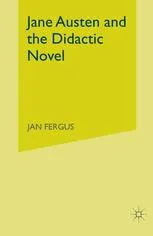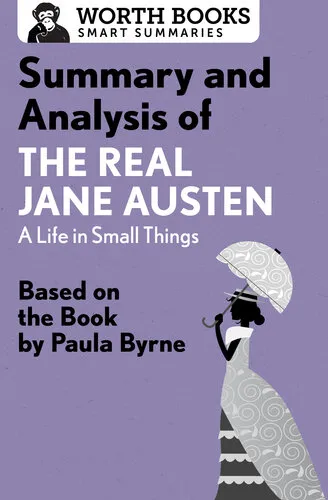Jane Austen and the Didactic Novel: Northanger Abbey, Sense and Sensibility and Pride and Prejudice
4.0
Reviews from our users

You Can Ask your questions from this book's AI after Login
Each download or ask from book AI costs 2 points. To earn more free points, please visit the Points Guide Page and complete some valuable actions.Related Refrences:
Persian Summary
Introduction to "Jane Austen and the Didactic Novel: Northanger Abbey, Sense and Sensibility and Pride and Prejudice"
"Jane Austen and the Didactic Novel" provides an insightful exploration into how three of Jane Austen's novels—Northanger Abbey, Sense and Sensibility, and Pride and Prejudice—serve as didactic works, blending moral instruction with narrative pleasure. This book offers readers and scholars a deeper understanding of the moral themes and instructional elements embedded within Austen's storytelling.
Detailed Summary of the Book
The book embarks on an in-depth analysis of Jane Austen's literary techniques and her nuanced approach to didacticism—a pedagogical intent to teach readers, particularly through moral lessons. It examines how Austen's unique narrative style and character development in these novels subtly educate her audience about virtues such as prudence, sensibility, and self-awareness. The author, Jan Fergus, dissects each novel, offering detailed commentary on Austen's use of irony, social critique, and character evolution to communicate her broader didactic goals.
Fergus begins with Northanger Abbey, where the focus is on Catherine Morland's journey from naivety to self-awareness. Readers are guided to explore how Austen critiques Gothic novels of the time while instilling a sense of discernment in her protagonist and audiences alike.
Transitioning to Sense and Sensibility, the book outlines Elinor and Marianne Dashwood's conflicting approaches to life and love. Fergus meticulously illustrates how Austen contrasts sense—represented by Elinor—with sensibility, as embodied by Marianne, delineating a balanced integration of reason and emotion as essential human virtues.
Finally, in the discussion of Pride and Prejudice, the book scrutinizes Elizabeth Bennet's journey towards overcoming prejudice and Darcy's battle with pride. Here, Austen's artistic dexterity in portraying character growth is revealed as a subtle yet profound commentary on personal virtues and societal expectations.
Key Takeaways
- Jane Austen employs didactic elements in her novels to convey moral lessons that are crucial for social and personal improvement.
- Austen's heroines are crafted to evolve through experiences, enabling readers to reflect on their own virtues and weaknesses.
- The novels balance entertaining narratives with moral undertones, making them timeless pieces of instructive literature.
Famous Quotes from the Book
"Austen's ability to weave humor with social commentary allows her fiction to act as covert instruction manuals for her readers."
"Through character development and irony, Austen crafts a narrative that is both delightful and educational, urging readers to aspire towards self-improvement."
Why This Book Matters
Understanding Jane Austen's novels as didactic not only enriches the reading experience but also highlights her role as a subtle moralist during the Regency era. Jane Austen and the Didactic Novel is essential for literary scholars, students, and fans of Austen who seek to unlock deeper meanings within her works.
The book acknowledges and celebrates Austen's genius in crafting narratives that, while firmly set in the early 19th century, resonate across generations due to their universal themes and moral insights. It challenges readers to delve beyond the surface, fostering a holistic understanding of Austen's literary legacy and her contribution to the evolution of the English novel.
Free Direct Download
You Can Download this book after Login
Accessing books through legal platforms and public libraries not only supports the rights of authors and publishers but also contributes to the sustainability of reading culture. Before downloading, please take a moment to consider these options.
Find this book on other platforms:
WorldCat helps you find books in libraries worldwide.
See ratings, reviews, and discussions on Goodreads.
Find and buy rare or used books on AbeBooks.
1533
بازدید4.0
امتیاز0
نظر98%
رضایتReviews:
4.0
Based on 0 users review
Questions & Answers
Ask questions about this book or help others by answering
No questions yet. Be the first to ask!













